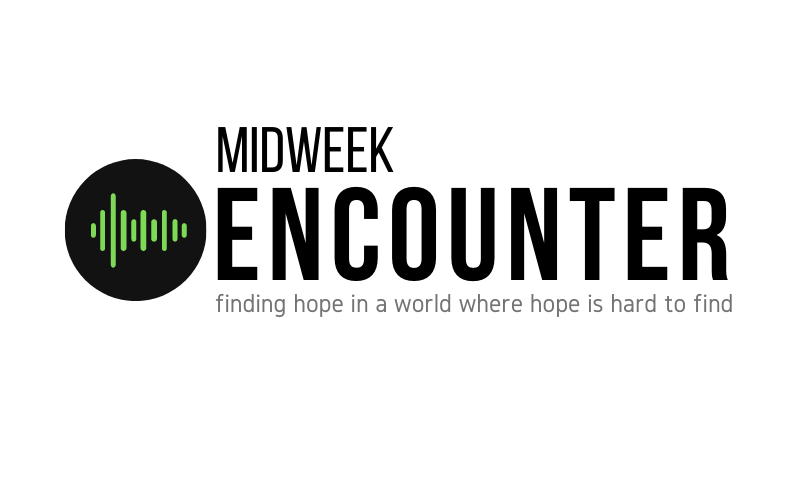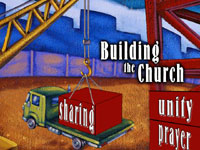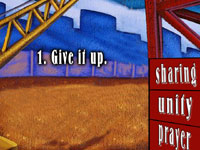



 Imagine how many times our small, seemingly insignificant gestures of concern may re-ignite the flame of life and inspire someone to continue on. Thankfully, compassion has a way of doing that. Chicken Soup for the Soul, Jack Canfield and Mark Hansen, 1993, p. 35
Imagine how many times our small, seemingly insignificant gestures of concern may re-ignite the flame of life and inspire someone to continue on. Thankfully, compassion has a way of doing that. Chicken Soup for the Soul, Jack Canfield and Mark Hansen, 1993, p. 35 There have often been misrepresentations of this scripture. At its most basic level it is a form of socialism that doesn’t work which is why we practice the spirit of the text. Believe me it has been tried through the ages. My own grandfather back in the early 1900’s, spent a little time on a Christian communal farm in Urbana Ohio. It was an attempt by some well meaning Christians to practice sharing in the purest form. They sold everything and pooled their resources and called it the All Things Common farm. They even published their own newspaper entitled, The Herald of Perfect Christianity. He didn’t last there very long because as one of my Uncles told me who is now in his eighties, “The leaders kids got most of the eggs when we went to the barn to search for them. Somehow they always seemed to get a little more than everyone else.” Ever studied Communism? It happens that way more often than not. The practice of sharing everything or all things equal did not last in the early church.
There have often been misrepresentations of this scripture. At its most basic level it is a form of socialism that doesn’t work which is why we practice the spirit of the text. Believe me it has been tried through the ages. My own grandfather back in the early 1900’s, spent a little time on a Christian communal farm in Urbana Ohio. It was an attempt by some well meaning Christians to practice sharing in the purest form. They sold everything and pooled their resources and called it the All Things Common farm. They even published their own newspaper entitled, The Herald of Perfect Christianity. He didn’t last there very long because as one of my Uncles told me who is now in his eighties, “The leaders kids got most of the eggs when we went to the barn to search for them. Somehow they always seemed to get a little more than everyone else.” Ever studied Communism? It happens that way more often than not. The practice of sharing everything or all things equal did not last in the early church.  1. Give it up! Deny yourself!Giving it up means that all of us have some role to play in touching others with acts of compassion and ministry. For the believer it means that we give our resources. What that means will vary from individual in individual. It may include money but today in our society, time as become as valuable as money. We are called to be involved and to be involved means that you and I will give up something that is precious to us in order to serve others. While serving on the board of a college the President came to a meeting one day and informed the board that when it came to fund raising we all had one of three responsibilities: Get it, Give it, or get off! In other words this not–for-profit college needed money to operate and we were not on the board to pad our résumés. We were on the board to produce resources. That was an interesting and eye opening meeting. Unfortunately we limit our view of who is a minister to the realm of the called clergy or paid staff. They above all others I believe should be setting the example of ministering, but it does not alleviate or eliminate the call and need for every member/believer to be defined and directed by the needs of ministry that are placed before the body. All of us as Christians/believers need to realize that we are ...
1. Give it up! Deny yourself!Giving it up means that all of us have some role to play in touching others with acts of compassion and ministry. For the believer it means that we give our resources. What that means will vary from individual in individual. It may include money but today in our society, time as become as valuable as money. We are called to be involved and to be involved means that you and I will give up something that is precious to us in order to serve others. While serving on the board of a college the President came to a meeting one day and informed the board that when it came to fund raising we all had one of three responsibilities: Get it, Give it, or get off! In other words this not–for-profit college needed money to operate and we were not on the board to pad our résumés. We were on the board to produce resources. That was an interesting and eye opening meeting. Unfortunately we limit our view of who is a minister to the realm of the called clergy or paid staff. They above all others I believe should be setting the example of ministering, but it does not alleviate or eliminate the call and need for every member/believer to be defined and directed by the needs of ministry that are placed before the body. All of us as Christians/believers need to realize that we are ...  2. Give it out. Deliver it!
2. Give it out. Deliver it! 3. Giving it back. Delight in it!
3. Giving it back. Delight in it!